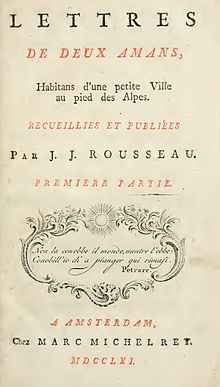Julie, or the New Heloise

First edition title page
|
|
| Author | Jean-Jacques Rousseau |
|---|---|
| Original title | Julie, ou la nouvelle Héloïse |
| Country | France |
| Language | French |
| Genre | Epistolary novel |
| Publisher | Marc-Michel Rey |
|
Publication date
|
1761 |
| Media type | |
Julie, or the New Heloise (French: Julie, ou la nouvelle Héloïse) is an epistolary novel by Jean-Jacques Rousseau, published in 1761 by Marc-Michel Rey in Amsterdam. The original edition was entitled Lettres de deux amans habitans d'une petite ville au pied des Alpes ("Letters from two lovers living in a small town at the foot of the Alps").
The novel's subtitle points to the history of Héloïse d'Argenteuil and Peter Abelard, a medieval story of passion and Christian renunciation. The novel was put on the Index Librorum Prohibitorum.
Although Rousseau wrote it as a novel, a philosophical theory about authenticity permeates through it, as he explores autonomy and authenticity as moral values. A common interpretation is that Rousseau valued the ethics of authenticity over rational moral principles, as he illustrates the principle that one should do what is imposed upon him by society only insofar as it would seem congruent with one's "secret principles" and feelings, being constituent of one's core identity. Thus unauthentic behavior would pave the way to self-destruction.
Arthur Schopenhauer cited Julie, or the New Heloise as one of the four greatest novels ever written, along with Tristram Shandy, Wilhelm Meister, and Don Quixote.
Historian Robert Darnton has argued that Julie "was perhaps the biggest best-seller of the century". Publishers could not print copies fast enough so they rented the book out by the day and even by the hour. According to Darnton, there were at least 70 editions in print before 1800, "probably more than for any other novel in the previous history of publishing."
But what was truly astonishing regarding Julie's popularity was not just its sales statistics, but the emotions it brought out in its readers. Readers were so overcome that they wrote to Rousseau in droves, creating the first celebrity author. One reader claimed that the novel nearly drove him mad from excess of feeling while another claimed that the violent sobbing he underwent cured his cold. Reader after reader describes their "tears", "sighs", "torments" and "ecstasies" to Rousseau. One wrote in a letter to Rousseau after finishing the novel:
...
Wikipedia
